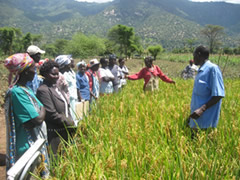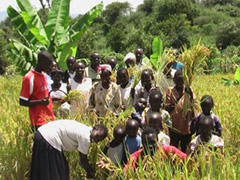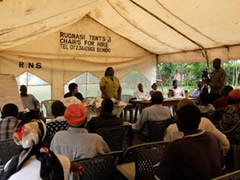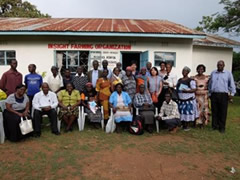- Home
- Technical Cooperation Projects
- Index of Countries
- Africa
- Kenya
- Project on Enhancing Gender Responsive Extension Services in Kenya
- Project News
- Interview with PEGRES Project Director, Madam Mary Kamau
Project News
2016-06-30
Interview with PEGRES Project Director, Madam Mary Kamau
PEGRES Project Implementation Unit (PIU) members interviewed Project Director, Madam Mary Kamau on her experiences on Agriculture sector in Kenya, working experiences with JICA and expectations toward PEGRES as follows;
PEGRES PIU: Could you kindly tell us your background and experience(s) in the Agriculture Sector in Kenya?
Madam Kamau: I have worked within the Agricultural Sector in Kenya for the last 35 years; most of these years I have been in agriculture extension. I have interacted with women farmers who form 60% of the smallholder farmers and play a big role in Agricultural Production.
My Journey started as an agriculture officer in the former large Kitui District (Now Kitui County), Eastern Kenya in the year 1980, and later moved to Makueni where I worked as District Agriculture Officer (DAO) in charge of agriculture activities with over 200 officers working under me.
My Working experience in Kitui was indeed fulfilling, notably improving livelihood of farmers, working together with very active and focused women groups. One important lesson I learnt while working in this area was that due to dry and severe climate, men tend to migrate to urban areas to seek for alternative sources of income while the women are left behind in the villages heading the households. What encouraged me most was that women were eager to learn new knowledge and improve their farming skills. Women in the groups helped each other, taking care of children together, working and encouraging each other. They were also involved in all the stages of agriculture value chain.
While working in Makueni District, I initiated a number of programmes. These include planting grafted mangoes and improved varieties of citrus which provided better income and livelihood for farmers. Today the District is a major producer of high quality mangoes and citruses. In addition, I promoted irrigation and growing of vegetables along the seasonal rivers. In collaboration with other partners we also promoted water harvesting and small holder irrigation. Another important activity was my involvement in promotion of joint marketing among farmers. All these efforts were aimed at empowering rural farmers, especially women by enhancing their livelihoods.
PEGRES PIU: We understand that your working experiences in the field provided a foundation for establishment of our project, PEGRES.
Madam Kamau: I believe "A strong household is built through livelihood improvement; and Empowering women farmers who are the majority of smallholder farmers is requisite for improved Agricultural Production."
After working for 14 years as a field worker and acquiring lots of experiences I moved to the Agricultural Headquarter Office in charge of a branch.
One major achievement on gender by the Ministry in the period between 2002 and 2007 was affirmative action in appointments. The then Minister of Agriculture, Honorable Kipruto Kirwa had a deep consideration towards gender mainstreaming. During his tenure, female officers in the ministry were empowered and their numbers in senior management positions in the ministry considerably increased. This was a major achievement even before the current one-third rule as provided in the Constitution of Kenya (2010) came to effect. Under the leadership of Hon. Kirwa then, the ministry established strong gender units both in Districts and Head Quarter levels. It was during this period that I was appointed as Director of Agriculture in charge of Agriculture Extension, Research Liaison and Training. Cross cutting issues including gender mainstreaming were parts of my duties.
PEGRES PIU: We are impressed by the Ministry past initiatives and considerations for gender mainstreaming, as we are now recommending Counties to have a gender unit at County and Sub-county levels, and we believe that Gender policy and strategy plays an important role in the Government system for gender mainstreaming. What is your take on this?
Madam Kamau: Under retired President Mwai Kibaki (2002-2013), our Government prepared "Economic Recovery Strategy (ERS)", and the Ministry of Agriculture came up with "Strategy for Revitalizing Agriculture (SRA)" to create livelihood in Kenya. The SRA had strong components on mainstreaming gender for all activities and projects in agriculture sector. As a result we witnessed good progress and development on gender mainstreaming in agriculture and agricultural development at large.
Also as a mitigation of Vision 2030, the Ministry prepared "Agricultural Sector Development Strategy", setting gender as part of the social pillar. The Constitution of Kenya the principle that not more than two-thirds of the members of elective and appointive bodies shall be of the same gender.
Our Ministry is now in the process of drafting a "Gender Strategy" incorporating issues in State Departments of Livestock and Fisheries, The Strategy will be an implementation framework for the Agriculture Sector Gender Policy. We expect Counties also to customize the Gender Policy once completed.
PEGRES PIU: Could you kindly tell us your current duties other than the roles of PEGRES Project Director?
Madam Kamau: As a Deputy Director of Agriculture I am now in charge of Agricultural Marketing and Advisory Services in the Ministry. We believe that extension should be market oriented hence the need to support farmers to acquire inputs and to build capacity for them on proper farming techniques.
After devolution, duties of National Government in Agriculture are currently as follows:
1) Policy making in consultation with County Governments,
2) Capacity building for personnel in County Governments,
3) Quality assurance of works done by County Governments, e.g. setting general guidelines of extension and standardizing/harmonizing appropriate technologies, and;
4) Monitoring and evaluation of activities done by County Governments and various programme/projects.
Through intergovernmental bodies and thematic working groups, we have strong cooperation between National and County Governments.
PEGRES PIU: We understand that you have various experiences working with Japan and also JICA. Could you kindly tell us your past experiences working with Japanese?
Madam Kamau: I was the Project Director for JICA and Government of Kenya (GoK)'s Technical Cooperation Project "Community Agricultural Development Project in Semi Arid Lands (CADSAL)" from 2005 to 2010. CADSAL's aim was improvement of livelihood in dry areas targeting 2 districts (Keiyo and Marakwet) in the former Rift Valley Province. It was such a good experience working with Japanese Experts. I also had experiences with another JICA project in Thika District whose objectives were based on promotion of KAIZEN-Continuous Quality Improvement in Thika Training Centre.
 Field day of CADSAL Project © MoALF
Field day of CADSAL Project © MoALF
 NERICA rice harvesting in CADSAL Project © MoALF
NERICA rice harvesting in CADSAL Project © MoALF
In 2010, I attended a JICA Training Course for Livelihood Improvement in JICA Tsukuba, Japan for two weeks, together with participants from various countries. While in Japan, I visited Women Groups which actively make rice cakes and other products, Road Side Markets (Michi-No-Eki), Agro-tourism sites and other marketing activities around Tsukuba and in Yamaguchi prefecture.
Rice fields in Japan are rather of small scale than Kenya, but have higher yields because of proper planning and system. Japanese farming is highly mechanized and very progressive. I was impressed to see ladies over 70 years being actively involved in community marketing activities such as rice cake making together. "Age is not a limit to participation in agriculture and community activities".
One lesson from my Japan visit was that Agro-tourism provides an opportunity for the young generation to understand agriculture. This can be implemented here in Kenya to expose our youth to agriculture.
PEGRES PIU: We understand your various experiences in livelihood improvement in Kenya and Japan, and that your work and passions led to our joint project, PEGRES, whose aim is livelihood improvement of all gender groups. Please tell us your expectations for PEGRES.
Madam Kamau: PEGRES is a unique project which focuses on gender, and its objective is institutionalization of gender related expertise by closely liaising with County Governments to strengthen gender mainstreaming in agriculture sector.
I expect that PEGRES will be a good example of gender mainstreaming for other Ministries and upscaling experiences of gender mainstreaming activities from JICA and GoK's Technical Cooperation Project "Smallholder Horticulture Empowerment Project (SHEP)".
I believe that family budgeting training which PEGRES plans to implement for farmers is very valuable for livelihood improvement. If we do not plan for our resources they will not be enough and we will lose. Planning leads to growth.
 Remarks by Madam Mary Kamau, PEGRES Project Director for Gender Awareness and Family Budgeting Training in Siaya County
Remarks by Madam Mary Kamau, PEGRES Project Director for Gender Awareness and Family Budgeting Training in Siaya County
 PEGRES Project Director and Farmer Groups trained in Siaya County
PEGRES Project Director and Farmer Groups trained in Siaya County
PEGRES PIU: Finally please give your message to people who will read this interview including people in Japan.
Madam Kamau: I would like to show my sincere appreciation to the Japanese People and JICA for long time continuous collaboration with the Ministry, through implementing various programme and projects jointly for livelihood improvement of farmers in Kenya.
Development projects should touch livelihood improvement at household level, and JICA Projects do so successfully.
I am pleased to have PEGRES project which targets both men and women for their livelihood improvement, we all know that women tend to be neglected in many project activities, though they are key for development and food security. I believe that supporting women leads Kenya to be a stronger nation.
JICA's development approach is unique; dispatch of Japanese Experts to work together with Kenyan Counterparts encourages cooperation. This approach has assisted Kenya to grow further. We look forward to more cooperation initiatives between Kenya and Japan.
Thank you very much again.
- About JICA
- News & Features
- Countries & Regions
- Our Work
- Thematic Issues
- Types of Assistance
- Partnerships with Other Development Partners
- Climate Change / Environmental and Social Considerations
- Evaluations
- Compliance and Anti-corruption
- Science and Technology Cooperation on Global Issues
- Research
- JICA Development Studies Program / JICA Chair
- Support for the Acceptance of Foreign HRs / Multicultural and Inclusive Community
- Publications
- Investor Relations
